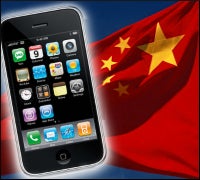 |
The launch of the iPhone in China is now underway, giving Apple a chance at a foothold in the world’s largest mobile market with 710 million subscribers.
Apple (NASDAQ: AAPL) and China Unicom, that country’s second-largest telecommunications firm, began selling the iPhone under a three-year deal.
“We’re thrilled to have launched iPhone in China with China Unicom,” an Apple spokeswoman told InternetNews.com..
Initial reports indicated that while hundreds of Chinese consumers waited for hours in line to buy the iconic handset, the response still proved less frenzied than the most recent iPhone launches in Europe, Japan and the U.S.
Industry watchers said the lessened response could be due to several factors that Apple will need to overcome to succeed in the Chinese market.
Apple’s obstacles
First, the iPhone’s price is fairly steep: Without a contract, prices for the devices range from $730 for the 8GB 3G model to $1,000 for the 32GB iPhone 3GS.
“It’s a big expectation on Apple’s part to expect consumers to cough up a month’s salary,” William Stofega, mobile analyst at IDC, told InternetNews.com.
Additionally, with a thriving gray market in China, comparable iPhone models can be had for much less money, Stofega said.
Another drawback is that the iPhones sold by China Unicom are stripped of Wi-Fi functionality to comply with government regulations.
“Apple has to deal with the fact that there’s local restraints — they can’t just roll into the country and have people slavishly follow them, even though it’s a fantastic device,” Stofega said. “There’s centralized control in China and the Chinese government will act in its best interest to make sure its favorite companies keep a competitive edge.”
Despite these potential challenges and the chance of culture clash between China Unicom and Apple, Stofega said some portion of the market will always pay the money to have the iPhone as a “status symbol.”
The stakes in the Chinese mobile market are high, as China’s smartphone production in 2010 will reach 30.2 million compared 21.2 million in 2009, an increase of 42.5 percent — almost triple the 15 percent growth rate in the overall global market, according to research firm iSuppli.
Apple, while experiencing soaring sales in the U.S., still lags behind rivals Nokia and Research In Motion (NASDAQ: RIMM) in worldwide market share — making its entry into to China a key opportunity to rise in the market’s current standings.
As of June 30, RIM’s BlackBerry global market share totaled 18.7 percent, up 1.4 percentage points from 17.3 percent last year, while the iPhone’s global market share hit 13.3 percent — a surge of 10.5 percentage points compared with the same period last year, according to technology research firm Gartner.
China Unicom had not returned calls seeking comment by press time.


